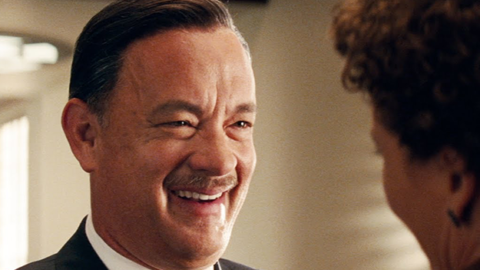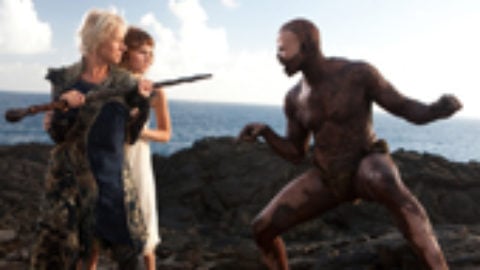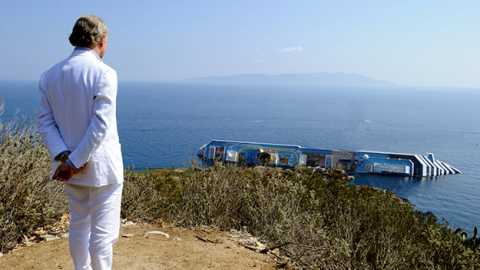Interview: Helen Mirren
In “Noblesse Oblige,” her essay about Helen Mirren’s career in the March/April issue of Film Comment, Ella Taylor wrote:
In her seventies Mirren remains a stylish glamour puss with an hourglass figure and legs the envy of women several decades her junior. She exults in her sexuality, but has never allowed herself to be defined by it on or off screen. Which may be why she has been an extraordinarily durable presence, if mostly in supporting roles. She landed her two greatest realist roles in middle age, when her youthful radiance deepened into mature complication as her face became at once more ordinary, and more intensely capable of signaling a woman with an inner life at war with itself. In Prime Suspect and The Queen, Mirren brings to vivid, unsettling life two women whose vastly different job descriptions require them to exercise enormous self-control, hold in vast reserves of emotion, and live with paying the price. There’s a sense in which her body of work is a walking history of women demanding a place at the table on their own terms.
And in this new interview, conducted in anticipation of her Chaplin Award Gala reception on April 30 at the Film Society of Lincoln Center, the versatile and beloved British actress talked to Taylor about acting in film, television, and theater (she’s currently busy with all three); the difficulties and opportunities facing actresses as they age; the Bechdel test, pro and con; and more.
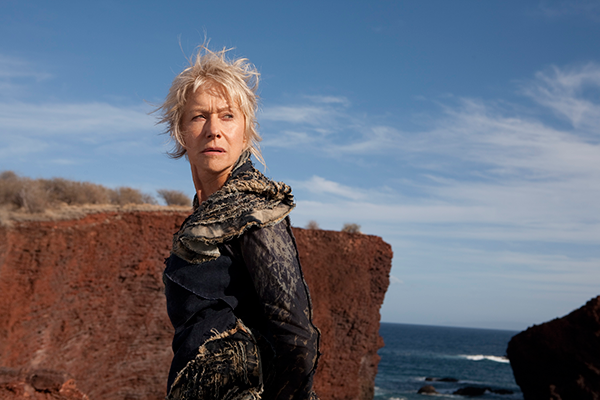
The Tempest
In my essay, I named my top Helen Mirren performances. Which are yours?
I loved doing The Tempest with Julie Taymor. It was very challenging, obviously, to do Shakespeare on film. Also to be gender-bending the role was interesting. But I loved the challenge of that. I also did a film called Some Mother’s Son a long time ago, which was basically about the hunger strike in Northern Ireland, and I loved doing The Debt, based on the Israeli film. If I can incorporate television as well, then, obviously Prime Suspect and long before that, in 1979 I did a Dennis Potter telefilm, Blue Remembered Hills. If I can add one more film, The Cook, The Thief, His Wife & Her Lover.
I watched The Cook, The Thief, His Wife & Her Lover again recently and loved it even more. On the one hand here’s this woman who is taking revenge for abuse, which is obviously topical right now. On the other hand it makes the case for feminine sexuality.
That was what I loved about it. It was a story of abuse but also of liberation and self-determination. The restaurant community absolutely loved it. For a short while, I could get any table in any restaurant.
British and American acting styles tend to be very different. I recently saw a little bit of your master class on acting, in which you said that the worst thing an actor can do is look in the mirror.
Acting has got to come from the inside out. Obviously there are elements that come from the outside in—costume, makeup, hair and stuff. All of that is enormously important, but the most important element in a performance is what’s coming from the inside. When you’re looking in the mirror and asking, does that expression do this or does it do that? The reality is you can’t control those things and you shouldn’t. If you try to control them, it becomes a sort of wooden box. There’s got to be a certain lack of control in acting.
It seems to me that as actors get older and less able to rely on youthful beauty, they then have the opportunity to play a character in a much more inward way, as you did in Prime Suspect and The Queen.
It was a great relief to be freed from the necessity of being a pretty young thing. For a long time it was the only thing—are you pretty enough or young enough? It didn’t matter how good an actress you were. I think that is changing, but certainly that was the case when I was young, and I saw actresses who were, quite frankly, not as good actresses as I was but much prettier, getting roles in film and television. So it’s a great artistic relief to be freed of that and then you feel, ah, now I can really start working.
You’ve been something of a pioneer in taking that attitude. Rather than having a whole lot of stuff done to your face, you’ve moved into a richer and deeper kind of acting.
Yes, absolutely. I mean I always took my profession incredibly seriously, you know rather pathetically seriously really.
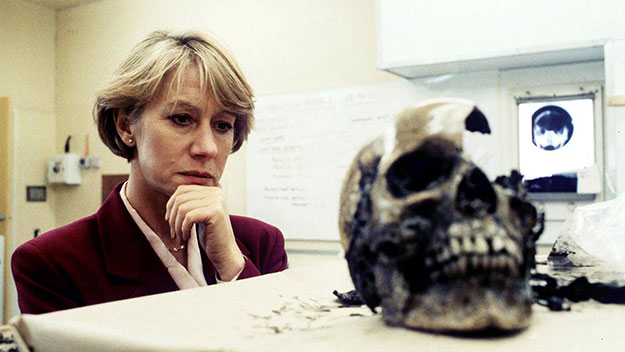
Prime Suspect
What do you mean, “pathetically”?
I was very, very dedicated as a young actress. I only wanted to be a classical theater actress and all my energy went towards that. For the first four or five years I was completely uninterested in film or television. I didn’t think that was acting, quite honestly. Then I realized I was missing a huge part of my art form. And I slowly started falling in love with film acting. But you know I didn’t reach that point until I was in my late twenties. I did try to become a French film actress in the late ’70s, because European films had more of the kinds of movie material that I was interested in. So I moved to Paris and tried to become a French actress. It didn’t really work out, and I came back to England. My great university of film acting was Prime Suspect. The writing was great and we had the budget and the schedule that made it possible to shoot things with a certain amount of artistic effort. We had a series of good directors—John Madden, Philip Martin, Tom Hooper. They taught me a huge amount.
The writing in Prime Suspect is terrific and it makes Jane Tennison a very innovative character because she’s neither a textbook feminist nor a girly-girl. She’s ambitious, she’s impatient, and in many ways, she behaves like a man.
That was the brilliance of Lynda La Plante, the original writer, who created the concept and the characters. And oh my God, it was such a great character to land in one’s lap because of everything you’re saying. It had those layers, that complexity. Tennison isn’t a strong woman. On the contrary, she’s weak in certain areas and vulnerable, and she has terrible flaws. I recognize her in myself, so it was always weirdly easy to fall back into Jane Tennison. I never did any prep. I would just walk on set and it would all start.
Moving on to The Queen, another inward performance because you’re playing this woman who on the one hand is being dragged unwillingly into the 21st century and on the other is absolutely determined to keep her dignity and her traditional way of looking at things.
Yes, and I think that’s a British way of looking at things, if there is a national characteristic. I mean my parents’ generation was so extraordinary, they went through a lot, being born at the end of one world war and then the Depression while they were growing up. Then in their teens or twenties, into the Second World War, and in the postwar years having children in a country that is on its knees, with rationing and so forth. That generation had it really tough, and I have enormous respect for them. And the Queen is very much part of that generation. We are so weak by comparison.
You had a pretty hybrid class background growing up, right? Your mother was working class and your father came from the world of Russian diplomacy. Did that have any influence on your work?
My great-grandmother on my father’s side was a countess. My mum was real East End working class, born in West Ham. My grandfather was the one going around the tradesmen’s entrance. My father worked in the East End as a tailor when he was 16. He was a participant in the Cable Street riots, along with the dockworkers.
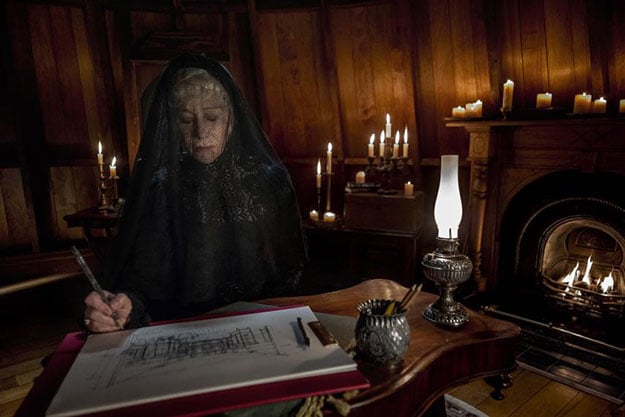
Winchester
Do you think that mixed class background has influenced your ability to play roles across the class spectrum?
That’s an interesting question. I never really thought it but maybe, I don’t know. Certainly there’s an energy and—how can I put it—a drive. I hate to be generalized or even termed working class. But people who come from a more economically challenged background, if you like, can have a drive and an energy, and a wit, and a humor, and a sort of toughness that is lovely to play as an actress.
I wonder if you think that, in Hollywood in particular, as actresses get older and they want to keep working, they often have to take on lesser films? Not necessarily lesser roles, but films that otherwise they might have turned down.
Yes, it happens to us all one way or another. And I think that’s one of the reasons that I always go back to the theater every four years. And then you know, it’s fun to work with different directors in different locations with different actors. I think actors like the social life of acting as much as the actual work itself. No, not social life, the community of walking onto a set and meeting the cinematographer, and getting your costume fitting. All of that is fun, so I often do a film just because of the location. With Winchester for example, I loved the idea of working with two young Australian directors.
I’m sure you’ve heard of the Bechdel test.
Yes, where women talk to each other on the screen without talking about a man. My God, absolutely.
I wonder what you think about that, whether the Bechdel test rather limits the range of what one can address in a film?
Oh yes, I mean obviously if the very subject matter is women talking about men, that’s a very different thing because women are at the center of the story and we’re looking at their reactions to men, and their feelings about their boyfriends. [But] so often women are simply used as a prop device to let the audience know something about the male character. So many scenes I’ve read where the wife says: “Where are you going, darling? I’m going to come with you” / “No, you can’t come with me, it’s far too dangerous” / “I don’t care, I’m coming anyway!” / “No, you can’t come” / “But why are you doing this?” / “I’m doing this because you know what I felt when my mother died.” So that’s a very different thing from a scene between two women where they’re talking about their husbands and how awful they are in bed.
Do you think that movie actresses today have it harder or easier than you did, or is it about the same, or different?
I think things have changed in the last five years. The roles are much better in general, everything that’s happened recently with the #MeToo movement, there’s this groundswell. I can’t believe it’s taken so long, but it is finally there. You know, when I did Prime Suspect, I was meant to do three series, but they couldn’t commit going in because they had no idea whether a female-led drama would be acceptable to the audience.
Ella Taylor writes about film for NPR.org, The Criterion Collection, and others. She teaches in the School of Cinema at the University of Southern California.




